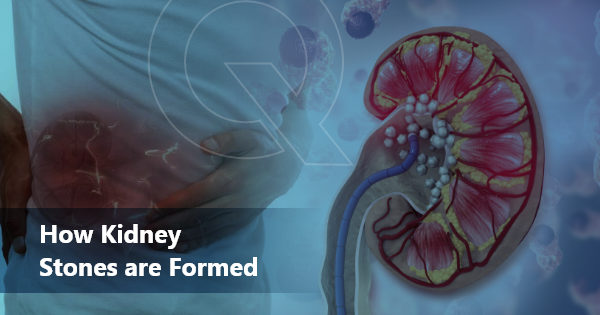Kidney stones, medically known as nephrolithiasis or renal calculi, are solid mineral deposits that form in the kidneys or urinary tract. These tiny, pebble-like structures can cause excruciating pain and a range of other symptoms when they obstruct the urinary tract. In this detailed blog, we will delve into the intricate process of how kidney stones are formed, exploring the factors that contribute to their development, types of kidney stones, and preventive measures.
Contents
Types of Kidney Stones
There are several types of kidney stones, classified based on their mineral composition:
1. Calcium Oxalate Stones: These are the most common type of kidney stones, accounting for about 80% of cases. They form when calcium combines with oxalate in the urine.
2. Calcium Phosphate Stones: These stones are also primarily composed of calcium but in combination with phosphate.
3. Uric Acid Stones: Uric acid stones form when there’s an excess of uric acid in the urine. They can be associated with conditions like gout.
4. Struvite Stones: Struvite stones are less common and often occur due to urinary tract infections. They can grow rapidly and become quite large.
5. Cystine Stones: Cystine stones are rare and form due to a genetic disorder that causes the kidneys to excrete too much cystine into the urine.
Formation of Kidney Stones
The formation of kidney stones is a complex process influenced by various factors, including genetics, diet, and hydration levels. Here’s a step-by-step breakdown of how kidney stones develop:
1. Supersaturation: It all starts with the urine becoming supersaturated with certain minerals. This happens when there’s an excess of minerals like calcium, oxalate, or uric acid in the urine. These minerals are normally dissolved in urine, but when their concentration becomes too high, they can no longer remain in solution.
2. Nucleation: Once the urine is supersaturated, tiny crystals begin to form. These crystals can be made up of calcium oxalate, calcium phosphate, uric acid, or other substances. These microscopic crystals serve as the initial building blocks of kidney stones.
3. Crystal Growth: Over time, these crystals can grow in size, layer by layer, as they accumulate more minerals from the urine. The size and type of kidney stone depend on the specific minerals involved and their concentration.
4. Aggregation: The crystals may stick together, forming larger aggregates. These aggregates can continue to grow and become visible kidney stones over time.
5. Obstruction and Pain: As the stones grow, they can obstruct the urinary tract. This obstruction can lead to severe pain and discomfort, especially when the stone moves from the kidney through the ureter toward the bladder.
Preventing Kidney Stones
Preventing kidney stones involves reducing the risk factors that contribute to their formation. Here are some key preventive measures:
1. Stay Hydrated: Adequate fluid intake is crucial in preventing kidney stone formation. Aim to drink plenty of water throughout the day.
2. Dietary Modifications: Adjust your diet to minimize foods high in oxalate, purines (for uric acid stones), and sodium. Consult a healthcare provider or dietitian for personalized dietary recommendations.
3. Medications: In some cases, medications may be prescribed to manage specific underlying conditions that increase the risk of kidney stones.
4. Regular Check-ups: Periodic check-ups with a healthcare provider can help monitor your kidney health and detect any early signs of stone formation.
Conclusion
Understanding how kidney stones form is the first step in preventing their occurrence. By taking proactive measures to maintain proper hydration, make dietary adjustments, and manage underlying medical conditions, you can significantly reduce your risk of developing these painful and bothersome stones. If you suspect you have kidney stones or are at risk, consult a healthcare professional for guidance tailored to your individual needs.
Frequently asked Questions
Q1:What are the main causes of kidney stones?
A1:Kidney stones can form due to various factors, and their exact cause can vary from person to person. However, the main causes and contributing factors to the formation of kidney stones include:
1. Dehydration: One of the most common causes of kidney stones is inadequate fluid intake. When the body doesn’t receive enough fluids, urine becomes concentrated, which can promote the crystallization of minerals in the urine.
2. Diet: The type of diet you consume plays a significant role in kidney stone formation. Diets high in certain substances, such as oxalate, calcium, and purines, can increase the risk of specific types of kidney stones.
– High Oxalate Intake: Foods like spinach, beets, sweet potatoes, nuts, and chocolate are high in oxalates, and excessive consumption can lead to calcium oxalate stones.
– High Calcium Intake: Contrary to popular belief, high dietary calcium intake, especially from supplements, can contribute to the formation of calcium-based kidney stones.
– High Purine Intake: A diet rich in purines found in organ meats, shellfish, and some fish can increase uric acid levels in the urine, potentially leading to uric acid stones.
3. Medical Conditions: Certain medical conditions can predispose individuals to kidney stone formation, including:
– Hypercalciuria: Excessive calcium in the urine.
– Hyperoxaluria: High levels of oxalate in the urine.
– Hyperuricosuria: High levels of uric acid in the urine.
– Cystinuria: A genetic disorder leading to increased cystine in the urine.
4. Family History: A family history of kidney stones can increase the risk, suggesting a genetic predisposition to stone formation.
5. Obesity: Obesity is associated with an increased risk of kidney stones, likely due to changes in metabolism and urinary excretion of stone-forming substances.
6. Urinary Tract Infections (UTIs): Certain types of kidney stones, known as struvite stones, can form as a result of recurrent UTIs.
7. Dehydration from Medical Conditions: Some medical conditions, like cystic fibrosis, can lead to chronic dehydration and an increased risk of kidney stones.
8. Medications: Certain medications, including diuretics (water pills), antacids with calcium, and some antiretroviral drugs, can contribute to stone formation by affecting urine composition.
9. Lifestyle Factors: Sedentary lifestyles and high-salt diets can also increase the risk of kidney stone formation.
It’s important to note that the exact cause of kidney stones can vary based on the type of stone (e.g., calcium oxalate, uric acid, etc.), and an individual’s risk factors may be influenced by a combination of these causes. If you suspect you have kidney stones or are at risk, consult a healthcare provider for a proper diagnosis and guidance on preventive measures.





